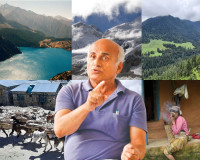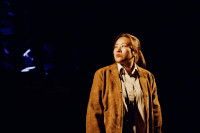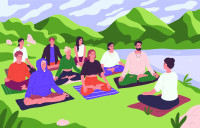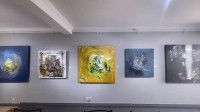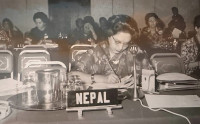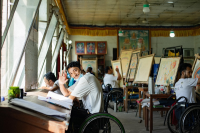Culture & Lifestyle
First day of Nepal Literature Festival sees diverse discourse
Despite the pandemic still rife, organisers of the festival say they decided to go ahead with the event virtually to give continuity to their work of bringing forth introspective discussions.
Post Report
The ninth edition of the IME Nepal Literature Festival kicked off on Tuesday at Sarangkot in Pokhara.
Despite the pandemic still rife, organisers of the festival say they decided to go ahead with the literary event virtually about two months ago to give continuity to their work of bringing introspective discussions to people from the literary and non-literary scenes.
“Our festival aspires to bring important discussion of relevant issues of the time to the public sphere besides discussing literary issues,” said Ajit Baral, founder and director of the festival. “We believe festivals like these also foster a democratic culture.”
The event first took place in 2011.
During the inaugural session, economist Biswo Paudel gave a keynote address on the title ‘Sahitya ko Aartha’ (The meaning/economy of literature). Paudel spoke of the growth of Nepali literature and the influence it has had on Nepali economy.
The inaugural session was followed by a panel discussion session with Chandra Prakash Baniya, writer of the novel ‘Maharani’, which won him the Madan Puruskar last year.
Over the years, the literature festival has brought together diverse people and encouraged interdisciplinary discussion. And this year too, it brought important topics to the front—from the effect of the pandemic on Nepal's public health to talking about Nepal’s young entrepreneurs.
The first session, titled ‘Karmath Ketiharu’, brought together entrepreneurs Bonita Sharma, Aayushi KC and Sonika Manandhar for a discussion with Avasna Pandey on the challenges of being young social entrepreneurs in Nepal. In the discussion, KC, the founder and CEO of the startup Khalisisi, said she considered it the responsibility of the youth to try and innovate with whatever means they had without complaining about the country all the time.
The next session, titled ‘Ke Sampada, Ke Basobas’, involved a discussion between heritage conservationist Rabindra Puri, architect Milan Bagale, and heritage activist Alok Ratna Tuladhar. During the session, the panelists spoke about the need to consider the neglect of Nepal’s unique culture and heritage as the country has been more concerned about adopting modern lifestyle and architectural styles.
In the session titled ‘Korona Pachhi ko Cinema’, filmmakers Bhaskar Dhungana and Min Bham spoke with journalist Yangesh on the effects of the coronavirus pandemic on filmmaking, and the way forward for Nepali cinema. The panelists also spoke about the need to focus on storytelling and script writing apart from adopting new technologies in filmmaking.
Likewise, in the session titled ‘Corona le Galayeko Janaswasthya’ Dr Anup Subedee, Dr Anup Bastola and Dr Rolina Dhital spoke to journalist Sobita Gautam about the challenges facing Nepal’s health sector in the wake of the coronavirus pandemic. Dr Subedee spoke about the need to focus on rigorous research in health so as to be able to respond to the problems of Nepal’s health sector, while Dr Dhital spoke about the positive deviants of the pandemic. Dr Bastola spoke about how the government health institutions, including the Sukraraj Tropical Disease Hospital, did exemplary work in providing healthcare to coronavirus patients despite resource constraints.
In the final session of the first day of the festival, writer Ilya Bhattarai spoke about the life and writing of her father and litterateur Madan Mani Dixit, and artist Roshan Mishra spoke about the life and art of his father and artist Manuj Babu Mishra.
The festival, conducted virtually, has 15 sessions and 50 participating speakers. All sessions of the festival are being aired live on YouTube and other social media accounts of the festival as well as Dishhome and Sarokar Television.
Organised by the Bookworm Foundation, the festival, which began in Kathmandu in 2011, has been held in Pokhara since 2016. Supported by the IME Group, the festival brings together writers, intellectuals and activists for wide-ranging discussions on literature, art, politics, society, entrepreneurship and social justice.




 8.26°C Kathmandu
8.26°C Kathmandu